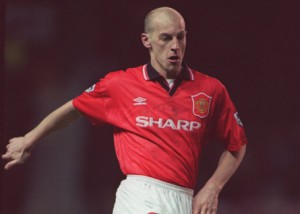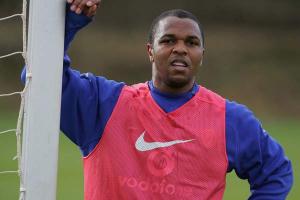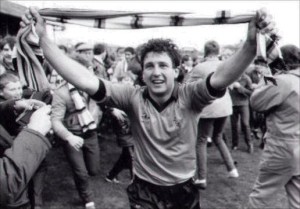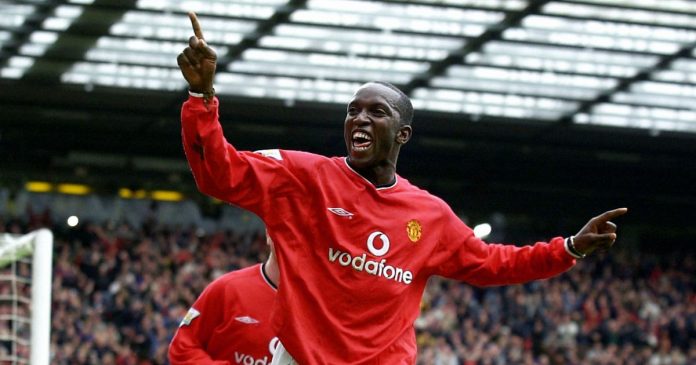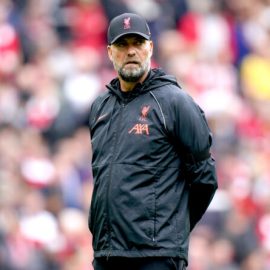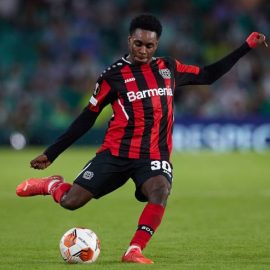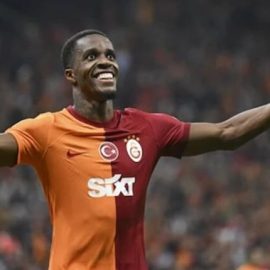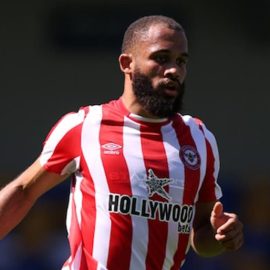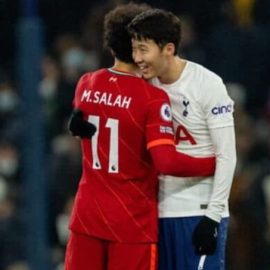Last week, we brought you Sir Alex Ferguson’s Greatest XI. This week, we’re taking a look at the other side of the spectrum as we name Sir Alex’s Worst Manchester United XI.
To err is human, and when you’ve been in charge as long as Sir Alex has, you’re bound to make some mistakes. Maybe the highly touted youngster that you signed and developed doesn’t pan out. Maybe the high-priced import doesn’t perform according to expectations. Maybe the grizzled veteran that you signed for leadership and experience was merely over-the-hill and nearing the end.
Ultimately, it’s up to the manager to correct his mistake and move on. Sir Alex Ferguson has proven that he’s able to do that, and he continues to keep the Old Trafford trophy cabinet full of silverware. Then again, I’m sure that’s of little consolation to some of these players:
Goalkeeper: Massimo Taibi
Not all goalkeepers can be Peter Schmeichel or Edwin Van der Sar. However, most of the Manchester United goalkeepers that stood between the posts during Sir Alex’s tenure were above average players that other managers would have killed for. Tim Howard was named to the PFA Best XI during his first season at Old Trafford and also became the first American to win an F.A. Cup. Fabien Barthez was brilliant during his first season at Manchester United, almost single-handedly preventing his squad from dropping points on a number of occasions en route to the Premiership title.
Even Raimond Van der Gouw, Mark Bosnich, and Roy Carroll had their moments in a United shirt. Maybe these guys didn’t reach the heights of Schmeichel or Van der Sar, but they had good careers and contributed to the United cause. In short, they weren’t great, but they weren’t horrible.
Then there was Massimo Taibi.
Taibi came over from Venezia for £4.4 million after Schmeichel left Old Trafford following the 1998-1999 season. Accounting for inflation, he cost twice as much as Howard, almost two-and-a-half times as much as Van der Sar, and nearly seven times as much as Schmeichel. Taibi got the start against Liverpool and committed a horrendous howler that allowed Sami Hyypia to score on a free kick.
United actually won that game, thanks to two own-goals from Jamie Carragher, so Taibi escaped blame for his error. Sadly, that gaffe would pale in comparison to what happened a couple of weeks later against Southampton.
You’ve seen the video. It’s one of the most famous miscues in recent EPL history. With the score 2-1, Southampton’s Matt Le Tissier fired a tame shot on goal that Taibi seemed to have covered. As he went to ground to cover it up, however, the ball trickled through his legs and went over the line for the equalizer.
Taibi later blamed his spikes for the mistake as Southampton went on to earn a 3-3 draw at Old Trafford after Le Tissier victimized Taibi again, this time after hammering a cross past a helpless Taibi from close-range. Taibi only played one more time for Manchester United, a 5-0 drubbing at the hands of Chelsea. He had no excuses this time and “The Blind Venetian” (as he was dubbed by the press) was shipped away to Reggina after the season.
Taibi still plays to this day, and has managed to carve out a fairly long career. Nevertheless, he’ll always be remembered for those handful of starts for United.
Right Back: David May
You know why Manchester United fans love Gary Neville so much? It’s not just because of his decades of service for club and country, his strong leadership skills, or his hatred of all things Liverpool. It’s because he spared United fans from having to see David May at right-back.
A £1.2 million purchase from Blackburn Rovers, May was a natural central defender. However, with Gary Pallister and Steve Bruce firmly entrenched at centre-back, Sir Alex decided to move May to right-back. The England native was acquired, among other reasons, because of UEFA restrictions on “foreign” players at the time. However, a string of poor performances ensued, with May taking part of the blame for Manchester United’s exit from European play in the 1994-1995 season.
The other main reason for his acquisition was because it came at the expense of title rivals Blackburn Rovers. Unfortunately for Sir Alex, Blackburn edged United out for the title during May’s first season at Old Trafford. While United’s loss was hardly May’s fault, he didn’t help his cause by losing his place at right-back to Neville. Injuries soon followed, and while May turned in some solid performances at center-back over the years, he never made the kind of impact that he hoped to.
He was recently voted the 47th worst player in modern English football. That might be a tad harsh, especially for a player who ended up becoming as big of an Old Trafford fan favorite as May. Ultimately, his lasting legacy at Manchester United was as a squad player and cheerleader from the bench. He memorably jumped onto the trophy table after the 1999 Champions League Final to lead the fans in chants. He also regularly conducted his orchestra at Old Trafford, with one favorite chant going “David May, Superstar! Got more medals than Shearer!”
Center Back: Laurent Blanc
Had Laurent Blanc joined Manchester United from Auxerre in 1995, he would have stood alongside the likes of Steve Bruce, Gary Pallister, Rio Ferdinand, Jaap Stam, and Nemanja Vidic as the best central defenders in club history. Had Laurent Blanc joined Manchester United in 1997 instead of going to Marseille, he still would have earned well-deserved plaudits for being a great defender. He was a former World Cup and European Title winner with France and was voted fourth best French Footballer of all time behind Michel Platini, Zinedine Zidane, and Raymond Kopa.
Unfortunately, Laurent Blanc joined Manchester United in 2001. By then, he was well past his prime and near the end of his glorious career. Even worse, he came to Manchester United to replace Jaap Stam, the heart of Manchester United’s defense who had suddenly left Old Trafford amidst a sea of controversy. Stam, he was not, and Blanc’s intelligence, veteran know-how, and experience did not make up for his diminishing skills, especially in the fast-paced English game. Plus, he and Fabien Barthez had a weird kissing ritual that they did before every game, which was more than a little creepy.
Blanc’s woes got worse when the media observed that if you took the first letter of each of the clubs that handed Manchester United their first five losses of the 2001-2002 season, then it spelled out B-L-A-N-C (for Bolton, Liverpool, Arsenal, Newcastle, and Chelsea). They also lost to West Ham and Middlesbrough that year, but unfortunately, Blanc’s first name wasn’t William, otherwise they really could have been onto something. They lost 9 times in all that season and finished 3rd, their worst showing ever in the Premiership, and failed to win a trophy for the first time 1997-1998. Blanc may not have been the primary reason for United’s “collapse” but he sure didn’t enhance his legacy by coming to Old Trafford.
Ultimately, Blanc retired after one more season for Manchester United. He currently coaches at Bordeaux, where he’s had a lot of success. He’s coming off a Ligue 1 title and has helped resurrect the career of United flop David Bellion (see below). For that, he surely deserves praise.
Center Back: William Prunier
He only made 2 appearances for Manchester United, but that was enough to earn him a legacy of infamy at Old Trafford.
Prunier had come up through the Auxerre system with Eric Cantona, and that connection was surely on Sir Alex’s mind as he invited Prunier to Manchester United for a trial. Sir Alex had planned on using Prunier, who had played 11 seasons in France and was hardly an inexperienced ingénue, in a few reserve-side matches so that he could properly evaluate the French defender. However, an injury crisis forced Sir Alex to start Prunier at center-back for two Premiership matches at the beginning of the 1994-1995 season.
Prunier made it through his first match unscathed, but turned in a disastrous performance against Tottenham during the following week. He was widely blamed for a nightmarish defensive effort that saw the club concede 4 goals. Even though many people thought that Prunier was unfairly singled out as the scape-goat, it was telling that Sir Alex merely offered him an extended trial rather than a permanent deal.
Prunier, perhaps knowing that he had no future with the club or feeling psychologically scarred after his experience at Manchester, turned Sir Alex down and fled back to the European mainland.
Left Back: Quinton Fortune
For the record, I actually liked Quinton Fortune. Unlike some of his contemporaries, especially Kieran Richardson, Fortune had a good attitude and worked hard. He just wasn’t very good.
Fortune was a decent utility man and squad player. Roy Keane was known to be a high on Fortune and always picked him first for five-on-five training drills. Unfortunately, he had trouble staying healthy, which no doubt led to him falling out of favor at Old Trafford.
In seven years, he only made 88 appearances for the club. Ultimately, once Gabriel Heinze made the position into his own after coming over from France, Fortune was a superfluous spare part. He failed to hold down spots at Bolton and Sunderland and was last seen playing in his native South Africa for AFC Tubize.
Ultimately, his lasting legacy at Old Trafford was his indirect role in the Ronaldo/Rooney bust-up at the World Cup. According to Rooney’s autobiography, the press reports of Ronaldo winding up Rooney before the match were false. Instead, Ronaldo was merely asking Rooney about rumors that Fortune was leaving the club (rumors that turned out to be true). Whether this was accurate or merely a cover-story, it looks like Fortune may have saved the Rooney/Ronaldo partnership at Old Trafford, at least for now…
Right Midfielder: Jordi Cruyff
Sometimes, the fruit does fall far from the tree.
It’s tough enough trying to succeed in football on your own merits. Having a legendary father who was one of the greatest players in history only makes it that much tougher.
However, having a famous father also gives you advantages that other players lack. Much like how David Sammartino grew up around wrestling royalty, Barry Bonds got to have Willie Mays as a godfather, and George W. Bush had all of his father’s advisers and donors at his disposal, Jordi Cruyff benefitted from his dad’s connections. He had access to the best training facilities. He was trained and taught by some of the best minds in the game. He broke into the Barcelona squad while his dad was the manager. Most of all, he had his father’s DNA. That had to count for something, right?
Well, it sure didn’t do him much good at Manchester United. Signed for £1.4 million, Cruyff rarely played with the first team. To be fair, he faced some stiff competition for spots, both in midfield and up front. If players like Teddy Sheringham and Nicky Butt were having trouble getting into games, then Cruyff didn’t stand a chance.
However, in his four years under contract at Old Trafford, he only made 55 appearances and scored a grand total of 8 goals. He only won one winner’s medal despite being around for one of the most successful periods in United’s history. Finally, United gave up on him and sent him to Alavés, where he played well. He still didn’t make anyone forget about his father, but then again, not many players could.
Center Midfielder: Juan Sebastian Veron
I’m going to get some flak for this one, so let me explain. Sabas wasn’t nearly as bad as he gets credit for (or discredit, I guess). He displayed moments of brilliance in both the Premiership and in Europe, although the vast majority of those moments came in the latter category. He was an excellent free-kicker and scored a number of impressive goals off set-plays. He was a great shooter and gave the team an excellent attacking dimension that they had lacked for years. In fact, if you watch the creatively-edited video below, then you might think that he was one of the greatest players in Manchester United history.
However, when you take into account his price-tag (£28.1 million, still the 13th highest in history and the third highest in Man Utd history), as well as the fact that he brought disharmony to the clubhouse by destabilizing what had been one of the best midfields in Europe, Juan Sebastian Veron was a complete and unmitigated disaster.
Sir Alex Ferguson desperately wanted to win the Champions League one more time before retiring at the age of 60 (he’s currently 67) and was disillusioned with his 4-4-2 formation after watching his squad come up short in Europe in both 2000 and 2001. He decided to blow it up by adding a playmaking midfielder to combat the European defenses that had succeeded by slowing the pace and manhandling United’s four-man midfield of David Beckham, Paul Scholes, Roy Keane, and Ryan Giggs (a foursome that was so good that Nicky Butt rarely got into games unless he was a sub or there was an injury). Veron, who was widely regarded as one of the best in the world, fit the bill and came aboard in the summer of 2001 after a protracted transfer saga (one that even got significant press coverage in America).
However, Veron struggled to adapt to the face-paced game known as English football. He needed space and time to set up his passes, and those were two things in short supply in England. He played well in Europe, turning in several good performances, however he could not stop United from losing to an unheralded Bayer Leverkusen team in the semifinals. His playing style, best described as “deliberate”made Dimitar Berbatov look like Carlos Tevez on speed, and his aversion to playing defense made Cristiano Ronaldo look the like second coming of Roy Keane. To say that he was not popular with the fans would be an understatement.
Worse, his presence on the team complicated Scholes’ role and forced him to play more as a support striker, which angered him so much that he actually refused to board the bus to a League Cup tie with Arsenal. Veron also played an indirect role in David Beckham’s departure. In 2003, Sir Alex’s decision to start an unfit Veron over a rapidly-falling-out-of-favor Beckham when Manchester United played Real Madrid in the second-leg of the Quarterfinals of the Champions League helped play a part in Beckham’s decision to leave in the offseason. Veron also left that summer, as Sir Alex sold him to Chelsea for nearly half what he paid.
Veron remains an excellent footballer, as he continues to put forth strong performances for Estudiantes. However, he also epitomizes the danger of buying someone without any prior experience in English football. If United decide not to pay Franck Ribery’s hefty fee this summer, then a major reason why will be because of its experience with Juan Sebastian Veron.
Center Midfielder: Eric Djemba-Djemba
For all the talk about United’s struggles in replacing Schmeichel, they’ve had even more trouble trying to find Roy Keane’s successor. In fact, you could argue that they still haven’t found a dominant defensive midfielder in the Keane mold, and that this was one of several reasons why they lost to Barcelona in the 2009 Champions League Final.
Djemba-Djemba was the first of many pretenders as Sir Alex bought him from Nantes for £3.5 million in 2003. He was about the same height and build as Keane, and his penchant for tough tackling and hard-nosed play made him seem like the perfect heir to the long-time United skipper. However, Djemba-Djemba was never able to establish himself at Old Trafford.
It didn’t help that there were others competing for the throne and Sir Alex seemed unable to settle on any of them, causing him to rotate Djemba-Djemba in and out of the starting lineup. Within 18 months, Djemba-Djemba was gone, having been sold to Aston Villa. He was even worse there and spent a season on loan to Burnley before moving to the place where all over-the-hill footballers go to make one last paycheck – Qatar. Unfortunately for him, he was only 26 when he made the move.
Sir Alex hinted that his on-the-pitch performance wasn’t the only reason why Djemba-Djemba failed at Manchester United. According to the Daily Mail, Djemba-Djemba lived the life of a spendthrift billionaire, even though he was hardly wealthy, even by footballing standards. He often seemed more interested in spending money than training, and he lived a life of luxury that would have made Mike Tyson and M.C. Hammer blush. He had a fleet of ten 4×4 cars, he had 30 different bank accounts, he wore expensive clothes, and he spent lavishly on his home, his family, and his friends. He was bankrupt by the time he was 26 years old and may owe more than £400,000 in English back-taxes.
It’s a shame that a player went from the penthouse to the outhouse as quickly as Djemba-Djemba did. His lasting legacy could very well be as a cautionary tale; a warning against living beyond your means as well as having unreasonable expectations forced on you. That surely wasn’t what Sir Alex or Djemba-Djemba had in mind.
Left Midfielder: Ralph Milne
Yes, Virginia. Someone did play left-wing for Manchester United before Ryan Giggs. He just didn’t play very well.
Milne was a dangerous offensive force for Dundee United, scoring 73 goals in 286 appearances for the Scottish club. Sir Alex, no doubt, remembered Milne’s prowess back when he managed Aberdeen, and hoped Milne would replicate that form for United. Milne, however, was already well past his prime, due in large part to an indifferent attitude that had driven his manager at Dundee, Jim McLean, to single Milne out as his greatest failure. In fact, when Milne got word that Sir Alex wanted to bring him to Manchester United, he thought he was being pranked.
Milne was hardly the second coming of George Best, however he was just like the United legend in one way: he was an absolute party animal. Milne, along with Norman Whiteside and Paul McGrath, was known to stay out until all hours of the night, hitting various pubs and imbibing massive quantities of alcohol. Milne’s contributions on the pitch were almost negligible, as he compiled a mere 3 goals on 23 appearances in two seasons for a goals-to-games ratio of 0.13. That may not have been higher than his usual blood-alcohol level.
Milne recently came clean about his alcohol problem and revealed that he had squandered most of his money on alcohol, women, and gambling. So, he may not have played like George Best, but he certainly did his best to live like him.
Forward: David Bellion
Sir Alex Ferguson is no stranger to being accused of breaking the rules. He was accused of tapping up Dwight Yorke while the latter was at Aston Villa. Jaap Stam wrote in his autobiography that Ferguson had approached him while the defender was still under contract to PSV Eindhoven. In those situations, it was easy to see why Ferguson may have been a little more aggressive than usual. Yorke and Stam were world-class talents that rank among the best players in United’s history.
But David Bellion?
You wonder why Sir Alex would risk exposing himself for someone like David Bellion. In 2003, Bellion came over to United from Sunderland amidst a sea of controversy. The previous season, he had disappeared during an important stretch of matches for relegation-threatened Sunderland (who were, in fact, relegated with one of the lowest point totals in Premiership history), saying that he was mentally unfit for a relegation battle as a result of family issues.
Many people thought that the real reason was that he didn’t want to get hurt because he knew Manchester United would be signing him in the offseason. In any event, Sir Alex was accused of tapping him up and paid £2 million in an out-of-court settlement (although, in fairness, Sunderland were entitled to compensation because of Bellion’s youth – we don’t know if the money was for that or for the tapping up since there was a confidentiality agreement involved in the settlement).
So, was the legal headache worth it? Hardly. Bellion’s stay at Old Trafford was a disappointment. He didn’t have many chances with the first team and, despite scoring against arch-rivals Leeds United in the League Cup, didn’t do much when he got chances to start. He went on loan to West Ham and rarely got into matches there. Finally, he left England and went back to France, first with Nice and then with Bordeaux where he’s developed into a very good player. He still might not be a world-class talent worth tapping up, but at least he’s a far cry from the player he was at Old Trafford.
Forward: Diego Forlan
To borrow a line from C & C Music Factory, here are some things to make you go “hmmm…” Manchester United acquired Diego Forlan for £6.9 million so that he could complement Ruud Van Nistelrooy up front. Forlan scored 17 goals in 96 appearances for Manchester United. By contrast, Van Nistelrooy scored 150 goals in 210 appearances for United, meaning that, at Forlan’s rate, he would need to make 848 appearances before matching Van Nistelrooy’s output in a United shirt. Ever since leaving Old Trafford in the 2004-2005 season, he’s scored a Van Nistelrooy-esque 109 goals in 205 appearances for Villarreal and Atletico Madrid. Hmm…
Assuming he isn’t on performance enhancers, either Forlan is one of those players who can’t play in England, or else he really needed a change of scenery.
To be fair, Forlan did have some success at Old Trafford. It took a while for him to get off the schnide (he went eight months before scoring his first United goal), but Forlan scored some big goals for the club. He found net in a couple of important late-season matches that helped Manchester United’s run to the 2002-2003 Premiership title. He also scored a brace against Liverpool that ensured his status as a fan favorite. However, he could never pull off a consistent run of form to satisfy his critics.
He even flubbed his goal celebration as he took off his shirt after a match-winner against Southampton and then couldn’t put it back on in time before the restart. He actually ran around bare-chested for a few seconds, leaving the commentators to wonder if they were watching a pick-up game of shirts-against-skins in the park, before officials ordered him off the pitch until he got redressed.
Forlan left Old Trafford at the beginning of the 2004-2005 season after United acquired Wayne Rooney in the offseason. He’s become one of the best strikers in the world while playing in Spain, winning the European Golden Boot in his first season at Villarreal (sharing the award with Arsenal’s Thierry Henry). He recently clinched a second Golden Boot after finishing the 2008-2009 La Liga season as the leading scorer with 32 goals. He could be returning to England this summer, so we’ll find out whether he really is a late bloomer or if his game is uniquely suited to Spain.
Add Sportslens to your Google News Feed!
